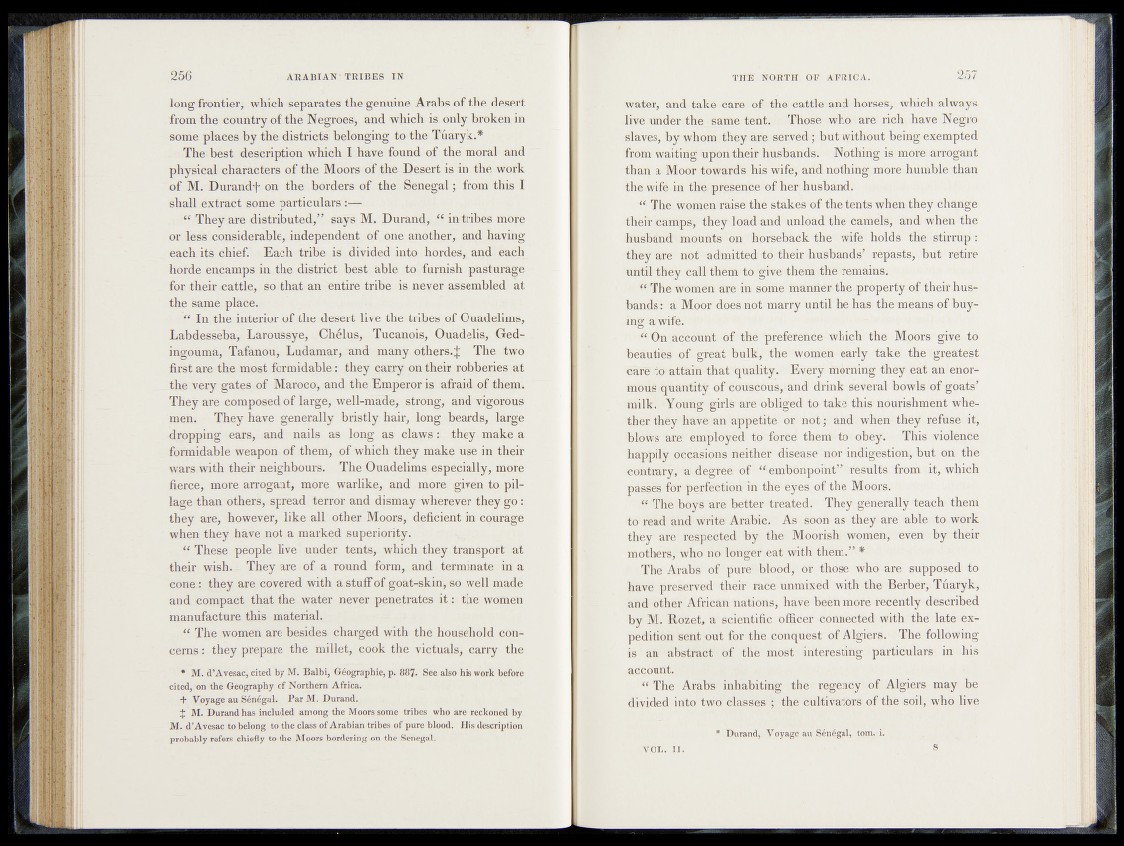
long frontier, which separates the genuine Arabs of the desert
from the country of the Negroes* and which is only broken in
some places by the districts belonging to the Tuàryk.*
The best description which I have found of the moral and
physical characters of the Moors of the Desert is in the work
of M. Durandf on the borders of the Senegal ; from this I
shall extract some particulars :—
“ Theyare distributed,” says M. Durand, | | in tribes more
or less considerable, independent of one another, and having
each its chief! Each tribe is divided into hordes, and each
horde encamps in the district best able to furnish pasturage
for their cattle, so that an entire tribe is never assembled at
the Same place.
“ In the interior of the desert live the tribes of Ouadelims,
Labdessëba, Laroussye, Chélus, Tucanois, Ouadelis, Ged-
ingouma, Tafanou, Ludamar, and many others.^ The two
first are the most formidable : they carry on their robberies at
the very gates of Maroco, and the Emperor is afraid of them.
They are composed of large, well-made, strong, and vigorous
men. They have generally bristly hair, long beards, large
dropping ears, and nails as long as claws : they make a
formidable weapon of them, of which they make use in their
wars with their neighbours. The Ouadelims especially, more
fierce, more arrogant, more warlike, and more given to pillage
than others, spread terror and dismay wherever they go :
they are, however, like all other Moors, deficient in courage
when they have not a marked superiority.
“ These people live under tents, which they transport at
their wish.- Theyare of a round form, and terminate in a
cone: they are covered with a stuff of goat-skin, so well made
and compact that the water never penetrates it : the women
manufacture this material.^
“ The women are besides charged with the household concerns
: they prepare the millet, cook the victuals, carry the
* M. d’Avesac, cited by M. Balbi, Géographie, p. 887. See also his work before
cited, on the Geography of Northern Africa.
+ Voyage au Sénégal. Par M. Durand.
+ M, Durand has included among the Moors some tribes who are reckoned by
M. d’Avesac to belong to the class of Arabian tribes of pure blood. His description
probably refers chiefly to the Moors bordering on the Senegal.
water, and take eare^ofiitheVotstJrleiandf^ho'rsfes^ which always
live underliej£sanfe:tentv<; Those who > are ri<$h$i have, Negro
slaves* by whom thjggpare^ses^d,:; but without- .being exempted
-from w,aiting|</upon their hjjugb'andsife Nothing^;! more arrogant
than a Moor towards his w|f|^a;nj|.,pothing m^eihumble than
the wifedrte the* presence of her husband.1 - ;
“ TheJvpnien «^isC the stakes###iO;fen'ts when they>Change
their camps;;; they load and" unload thc?e®ildM| and when the
husband mounts on »iho.fe^ae'k-the''' wife! holds <'®|gi!&tirrup':
they are nM admitted todhteir husMrids^^r^as^Jbut retire
until t h r a l l themto*give them .th&B^akfe. '
> (< The womeSt'are in soffle maniierithli^r^erty\^theif;husf
bands: a Moor dodfehot marry until he has the^m'eans:G|fcbuy-
Aa'g' a wife.
‘ “ On.account of the preference which the MpOr&fgiye to
beauties- pfi great bulk, the women early “take theifgre&fe&t
carento attain that quality.' Every rhyming they eat anenor-
mOli| quantity of 'couscous, and drink several bowlsfofigoats^
milk. YoUng girls are obliged to take this nourishment whb-
ther they have aii -appetite or not; and when they refusedit-,
bli%s are. dmjpfoyed to fbrCe’ them tojofee^w a This;viol*|nfe%
happily occasions neither dise^satnor indigestion* but- on thb
Contrary, a degree "of “ dmbonpoiht” fi#sullM.;from > it, which
passes for perfection in the- eyes, oT the Mdors: ^
“ The boys are better treated. The^* generally- teach-- them
to read and write Arabic. As soonvas'they are able- to work
they’ are respected -by the Moorish women, even* , by their
mothers, who no longer eat with them.” *
The Arabs of pure blood, or those who’are supposed to
have preserved their race unmixdd with the Berber, Tuaryk,
and other African nations* have been more recently desdHbed
by M. Itozet, a scientific officer connected with the late expedition
sent out for the conquest of Algiers.' The following
is an abstract of the most interesting particulars in his
account.
“ The Arabs inhabiting the regencylpf Algiers may be
divided itito two classes ; the cultivators of the soil?, who live
* Durand, Voyage au Sénégal, tom. i.